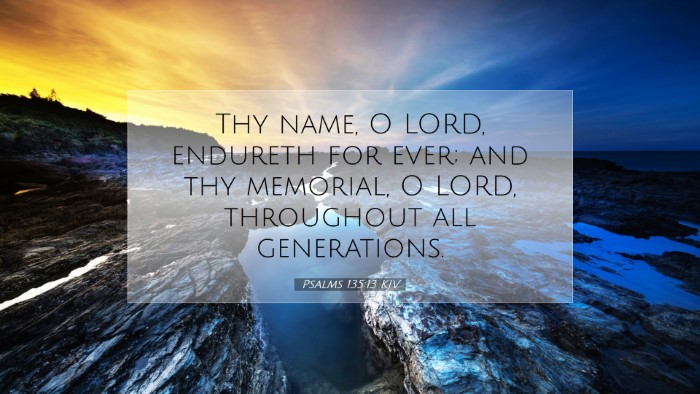Commentary on Psalms 135:13
Psalms 135:13: "Thy name, O Lord, endureth for ever; and thy memorial, O Lord, throughout all generations."
Introduction
This verse from the Book of Psalms exalts the enduring character of God's name and His presence throughout generations. In light of this profound declaration, various commentaries provide insight into its implications for worship, remembrance, and the nature of God's relationship to His people.
Divine Name and Eternity
Matthew Henry Commentary: Henry emphasizes the significance of God's name as a testament to His eternal presence. He elucidates that God’s name implies His essence, attributes, and reputation—each of which stands unchanging and everlasting. Henry notes that this everlasting nature of God’s name assures believers of His continuous support and faithfulness in every generation.
Albert Barnes Commentary: Barnes focuses on the theological implications of God’s name enduring forever. He explains that God's name represents His character and nature, which is inherently unchanging. The permanence of His name offers a source of comfort and assurance to the faithful, suggesting that they can always rely on God’s unchanged nature in a world marked by transience.
Adam Clarke Commentary: Clarke affirms the notion of the sacredness of God's name and its eternal significance. He remarks that the name of the Lord is praised by all generations as they recognize His sovereign authority and faithfulness. Clarke connects this enduring name to the covenants God made, showcasing that throughout history, His promises remain intact and true.
Memory and Remembrance
Matthew Henry Commentary: Henry reflects on the importance of remembering God's works and His name as vital expressions of faith. He posits that generation after generation should testify to God's providence and deliverance. The act of remembering serves as both a personal and communal testament to the faithfulness of God.
Albert Barnes Commentary: Barnes adds that the commemoration of God's name encourages believers to pass down their faith experiences to subsequent generations. He advocates for the importance of teaching the next generation the righteousness and mercies of God, ensuring that His legacy is preserved through stories and teachings.
Adam Clarke Commentary: Clarke underscores the significance of memorials in recognizing God’s work. He notes that throughout Scripture, reminders of God’s faithfulness serve to bolster faith in both individual and collective contexts. The verse invites believers to cultivate a culture of remembrance, centered around God’s eternal name and deeds.
Theological Reflection
Matthew Henry Commentary: Henry discusses the implications of God’s eternal nature on the believer's trust and faith. He asserts that understanding the constancy of God's name enables believers to anchor their hope amid life's uncertainties. The eternal God invites worship, recognizing He is the same yesterday, today, and forever.
Albert Barnes Commentary: Barnes encourages a reflective faith practice centered on God’s eternal name. He emphasizes that knowing God’s name endureth forever challenges believers to live in accordance with that truth. The faithfulness of God's character compels them to respond in worship and reverence.
Adam Clarke Commentary: Clarke suggests that acknowledging God's name extends beyond intellectual agreement; it necessitates a lifestyle of worship and obedience. He warns against living as if God's name were not significant, calling believers to a deeper personal relationship with the everlasting God.
Application for Believers
The implications of Psalms 135:13 extend into daily Christian living and the practical application of faith. Here are several key applications highlighted by the aforementioned commentaries:
- Trust in God's Unchanging Character: Understanding that God's name endures forever encourages believers to trust Him amid life's trials (Matthew Henry).
- Importance of Teaching Next Generations: The call to pass on knowledge and experiences of God’s faithfulness is vital for the continued spiritual vitality of the community (Albert Barnes).
- Calling to Worship: The eternal nature of God’s name invites every believer to a life of worship that acknowledges His sovereign authority (Adam Clarke).
- The Need for Remembrance: Constructing practices that incorporate the remembrance of God’s works is essential in maintaining a vibrant faith; it strengthens the individual's spiritual foundation (Matthew Henry).
- Active Engagement with God's Name: Reflecting on the significance of God's name can deepen one’s relationship with Him and inspire active faith through obedience and service (Adam Clarke).
Conclusion
Psalms 135:13 serves as a profound reminder of God’s eternal nature and the significance of His name across generations. It calls believers to trust, remember, and proclaim the steadfastness of God’s character. By anchoring their lives in the truths of His name, believers are invited to cultivate a legacy of faith that can withstand the tests of time, encouraging others to look to God as the eternal source of hope.


